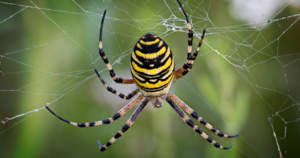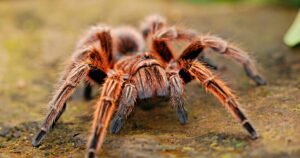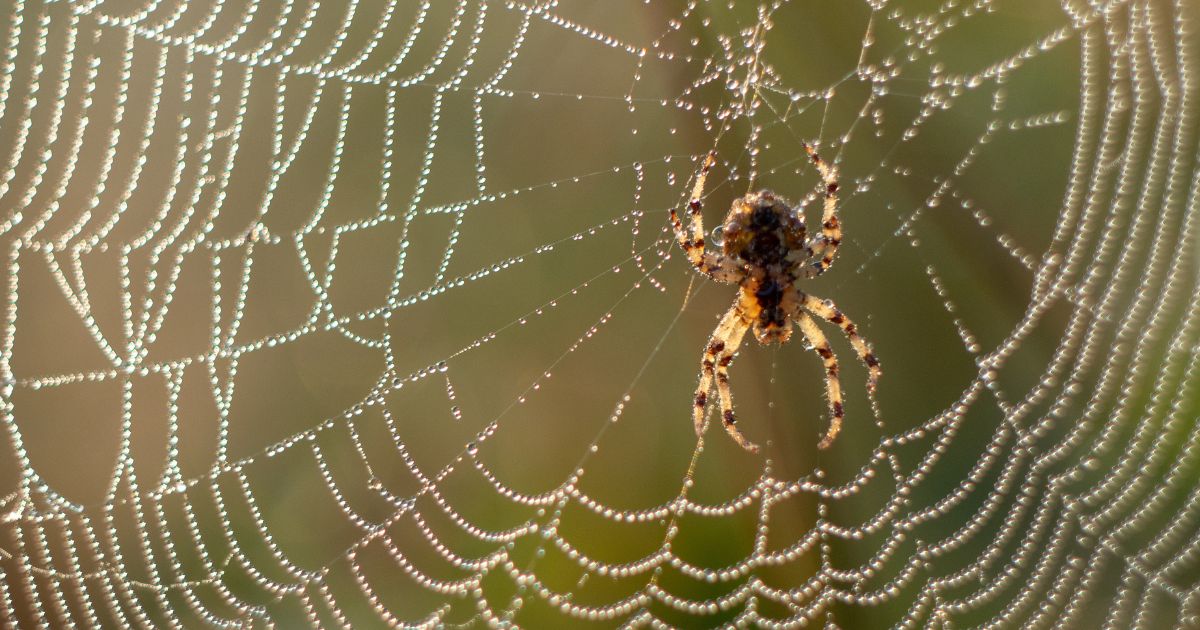Not killing a spider allows it to continue its role in the ecosystem. It can reduce pests and contribute to biodiversity.
Spiders are often feared or misunderstood, but they play a pivotal role in maintaining the balance of nature. These arachnids are expert hunters, preying on insects that could otherwise become pests in your home or garden. By allowing a spider to live, you’re letting it serve its purpose as a natural pest controller.
Spiders also serve as food for other wildlife, weaving a crucial thread in the web of life. Embracing their presence can enhance the ecological harmony around us. A spider’s life is a small but significant cog in the wheel of our planet’s biodiversity, and respecting their existence can have positive repercussions for the environment we share.

The Role Of Spiders In Ecosystems
Think of spiders as unsung heroes in our ecosystems. Their role is vital yet often misunderstood. Let’s explore what happens if you choose not to kill a spider. You might be surprised by the benefits these eight-legged creatures provide.
Natural Pest Control
Spiders are nature’s pest controllers. They consume vast amounts of insects daily. A world without spiders would see a surge in pest populations. These pests can destroy crops and spread diseases.
- Spiders eat mosquitoes, flies, and roaches.
- They help maintain a balance in your home’s ecosystem.
- Spiders reduce the need for chemical insecticides.
Pollination And Plant Health
Spiders contribute to pollination. They move from plant to plant in search of prey. This movement aids in the transfer of pollen. Healthy plants depend on pollination for reproduction.
| Spider Activity | Benefit to Plants |
|---|---|
| Prey Hunting | Pollen Transfer |
| Webs in Plants | Capturing Plant Pests |
Common Myths About Spiders
Spiders often stir fear and curiosity in equal measure. Many myths surround these eight-legged creatures. Let’s debunk some common myths and discover what truly happens if you don’t kill a spider.
Danger To Humans
Most spiders are harmless. A common myth suggests all spiders pose a danger to humans. This is not true. In reality, only a few species can harm humans with their venom. Even those that can bite often choose to flee rather than attack.
- Black Widow and Brown Recluse spiders are among the few dangerous ones.
- Most spider bites result in mild reactions.
- Spiders control pests, reducing other insect bites.
Home Infestations
Another myth is that not killing a spider leads to home infestations. This is rare. Spiders prefer solitary lives. They don’t multiply quickly like insects. A few spiders around can actually help by eating other pests.
| Myth | Fact |
|---|---|
| Spiders breed rapidly in homes | Spiders reproduce slowly, so infestations are uncommon |
| Every corner will have webs | Most spiders are reclusive and avoid human spaces |
Remember, spiders contribute to a balanced ecosystem. They are natural pest controllers. So, next time you see a spider, consider the benefits it brings to your home.
Consequences Of Killing Spiders
Consequences of Killing Spiders often go unnoticed. Yet, these small creatures play vital roles in our ecosystems. Let’s explore what happens if we choose not to harm them.
Disruption Of Food Webs
Spiders serve as critical predators in many food webs. By consuming insects, they regulate populations and maintain balance. Killing spiders can lead to unintended shifts in this balance.
Increased Pest Populations
With fewer spiders, pest numbers can surge. This rise can affect homes, gardens, and crops. It can also increase the spread of diseases carried by these pests.
- Spiders eat harmful insects like mosquitoes and flies.
- They help protect plants and crops from pests.
- Less spider means more pests.
Benefits Of Living With Spiders
Many people shiver at the sight of a spider. Yet, these eight-legged creatures offer surprising benefits. Learn why you might want to let that spider live.
Reduced Home Pests
Spiders are nature’s pest control. They feast on insects we often dislike. A single spider can consume thousands of pests yearly. This includes mosquitos, flies, and roaches. Your home stays cleaner and more comfortable.
- Bold catches mosquitos
- Eats annoying flies
- Keeps roaches at bay
Contribution To Biodiversity
Spiders are key players in the ecosystem. They help maintain a balanced environment. Their webs are a sign of a healthy home ecosystem. Spiders support plant pollination by controlling insect populations.
| Biodiversity Role | Benefit |
|---|---|
| Pest Control | Healthier Plants |
| Pollination Support | More Flowers |
Spider Conservation Efforts
The thought of not killing a spider may make some shudder. Yet, these creatures play a critical role in our ecosystem. By understanding and supporting spider conservation efforts, we not only help spiders but also the environment. Let’s explore the importance of keeping these eight-legged architects around.
Habitat Protection
Spiders thrive in diverse habitats, from forests to grasslands. Protecting these areas is vital. Conservation organizations work tirelessly to safeguard these environments. By preserving natural habitats, we ensure spiders continue to manage pest populations and maintain ecological balance.
- Preserve natural areas to maintain spider populations.
- Support legal frameworks that protect spider habitats.
- Encourage sustainable land use to reduce habitat destruction.
Educational Programs
Educational initiatives are key to changing perceptions about spiders. These programs teach the public about the benefits of spiders and how they contribute to our world. Knowledge can turn fear into fascination and respect.
- Develop curricula that include spider conservation.
- Host workshops and seminars for all ages.
- Create interactive exhibits in museums and zoos.
By participating in habitat protection and educational programs, we can take meaningful steps toward spider conservation. Our ecosystems depend on these silent guardians. So, the next time you encounter a spider, consider its role in nature and choose conservation over elimination.

How To Coexist With Spiders
Spiders might seem scary, but they play a crucial role in our ecosystem. They help control pests in our homes and gardens. Understanding this, we can learn to live alongside them peacefully. Let’s explore some methods to coexist with these eight-legged friends.
Safe Relocation Practices
Finding a spider indoors doesn’t mean you have to kill it. Instead, relocate it safely. Use a glass and a piece of paper to trap and move the spider. Slide the paper gently under the glass with the spider inside. Then, release it outside, away from your home.
Preventing Unwanted Encounters
To minimize spider encounters, keep your space tidy. Clutter offers hiding spots for spiders. Regular cleaning deters these critters. Seal cracks and openings around windows and doors. This stops spiders from entering. Use screens on windows and vents.
Here are additional tips:
- Remove webs when you see them.
- Use peppermint oil; spiders dislike the scent.
- Store food properly to avoid attracting insects, which are spiders’ prey.
Identifying Harmless Vs. Harmful Spiders
Identifying Harmless vs. Harmful Spiders is crucial for peaceful coexistence. Most spiders are beneficial. They eat pests. Yet, some can be dangerous. Knowing the difference is key.
Common Harmless Species
Many spiders in your home are harmless. They prefer avoiding humans. Their bites, if they occur, cause minimal issues.
- Cellar Spiders: Long-legged, web-weavers, non-aggressive.
- Jumping Spiders: Small, fuzzy, curious creatures. They rarely bite.
- Orb-Weaver Spiders: Known for intricate webs. They are not a threat.
Recognizing Dangerous Spiders
Some spiders pose risks. It’s vital to recognize them. Here are tell-tale signs:
| Spider Type | Markings | Behavior |
|---|---|---|
| Black Widow | Red hourglass on abdomen | Shy but venomous |
| Brown Recluse | Violin-shaped mark on back | Reclusive, bites when threatened |
Myth-busting: Truths About Spider Behavior
Spiders often spark fear and myths. Let’s unravel the truths about these creatures. Understanding spider behavior can ease concerns and highlight their role in ecosystems.
Web-building Habits
Not all spiders weave webs. Some hunt on the ground. Web types vary by species. Orb webs, funnel webs, and sheet webs are common styles.
- Orb webs are circular and capture flying insects.
- Funnel webs have a funnel-shaped retreat for the spider.
- Sheet webs are horizontal with a tangle above.
Spiders rebuild or repair their webs as needed. They remove old, damaged webs. This keeps their hunting grounds effective.
Misconceptions About Aggression
Spiders rarely bite humans. They bite only in defense. Most spider bites are harmless. Only a few species have venom that affects humans.
| Spider Type | Aggression Level | Impact on Humans |
|---|---|---|
| Common House Spider | Low | Harmless |
| Black Widow | Medium | Medically Significant |
| Brown Recluse | Medium | Medically Significant |
Spiders control pests. They eat insects that can harm crops. They serve as natural pest control. Leaving spiders be can benefit gardens and homes.
Frequently Asked Questions
Will Spiders Leave If Not Disturbed?
Spiders typically prefer undisturbed areas to settle. If left alone, they often remain in their chosen spot, focusing on catching prey rather than roaming around.
Do Spiders Remember Human Encounters?
Most spiders have simple nervous systems and are unlikely to remember specific interactions with humans or consider them significant in their behavior patterns.
What Benefits Do Spiders Provide Indoors?
Indoors, spiders help control insect populations, reducing pests like flies and mosquitoes that can be both annoying and harmful to humans.
Conclusion
Embracing spiders can be beneficial for your home environment. These eight-legged creatures play a pivotal role in controlling pests and maintaining ecological balance. By choosing not to harm them, you’re contributing to biodiversity and gaining natural allies in your living spaces.
Remember, a spider left unharmed is a step towards a healthier, more harmonious coexistence with nature.
Related posts:

I’m MD Tanvir, and I bring years of expertise gained from working closely with pest control companies to the forefront. My journey in the industry has inspired me to launch Bug Battler, a platform aimed at equipping people with the know-how to combat pests autonomously. Through Bug Battler, I aim to empower individuals with practical insights to tackle pest infestations effectively.

